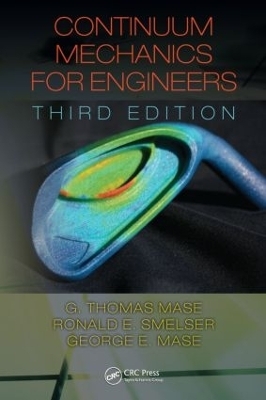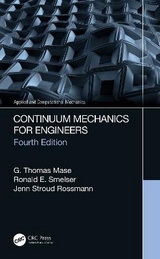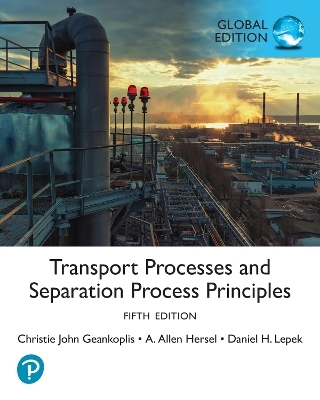
Continuum Mechanics for Engineers
Seiten
2009
|
3rd edition
Crc Press Inc (Verlag)
978-1-4200-8538-9 (ISBN)
Crc Press Inc (Verlag)
978-1-4200-8538-9 (ISBN)
- Titel erscheint in neuer Auflage
- Artikel merken
Zu diesem Artikel existiert eine Nachauflage
Provides the introductory background needed to make effective use of the advanced engineering design tools and methods. This edition contains information on engineering areas such as micro-mechanics and biomechanics. It also provides number of worked examples and end-of-chapter problems.
Continuum Mechanics for Engineers, Third Edition provides engineering students with a complete, concise, and accessible introduction to advanced engineering mechanics. The impetus for this latest edition was the need to suitably combine the introduction of continuum mechanics, linear and nonlinear elasticity, and viscoelasticity for a graduate-level course sequence. An outgrowth of course notes and problems used to teach these subjects, the third edition of this bestselling text explores the basic concepts behind these topics and demonstrates their application in engineering practice.
Presents Material Consistent with Modern Literature
A new rearranged and expanded chapter on elasticity more completely covers Saint-Venant’s solutions. Subsections on extension, torsion, pure bending and flexure present an excellent foundation for posing and solving basic elasticity problems. The authors’ presentation enables continuum mechanics to be applied to biological materials, in light of their current importance. They have also altered the book’s notation—a common struggle for many students—to better align it with modern continuum mechanics literature. This book addresses students’ need to understand the sophisticated simulation programs that use nonlinear kinematics and various constitutive relationships. It includes an introduction to problem solution using MATLAB®, emphasizing this language’s value in enabling users to stay focused on fundamentals.
This book provides information that is useful in emerging engineering areas, such as micro-mechanics and biomechanics. With an abundance of worked examples and chapter problems, it carefully explains necessary mathematics as required and presents numerous illustrations, giving students and practicing professionals an excellent self-study guide to enhance their skills. Through a mastery of this volume’s contents and additional rigorous finite element training, they will develop the mechanics foundation necessary to skillfully use modern, advanced design tools.
Continuum Mechanics for Engineers, Third Edition provides engineering students with a complete, concise, and accessible introduction to advanced engineering mechanics. The impetus for this latest edition was the need to suitably combine the introduction of continuum mechanics, linear and nonlinear elasticity, and viscoelasticity for a graduate-level course sequence. An outgrowth of course notes and problems used to teach these subjects, the third edition of this bestselling text explores the basic concepts behind these topics and demonstrates their application in engineering practice.
Presents Material Consistent with Modern Literature
A new rearranged and expanded chapter on elasticity more completely covers Saint-Venant’s solutions. Subsections on extension, torsion, pure bending and flexure present an excellent foundation for posing and solving basic elasticity problems. The authors’ presentation enables continuum mechanics to be applied to biological materials, in light of their current importance. They have also altered the book’s notation—a common struggle for many students—to better align it with modern continuum mechanics literature. This book addresses students’ need to understand the sophisticated simulation programs that use nonlinear kinematics and various constitutive relationships. It includes an introduction to problem solution using MATLAB®, emphasizing this language’s value in enabling users to stay focused on fundamentals.
This book provides information that is useful in emerging engineering areas, such as micro-mechanics and biomechanics. With an abundance of worked examples and chapter problems, it carefully explains necessary mathematics as required and presents numerous illustrations, giving students and practicing professionals an excellent self-study guide to enhance their skills. Through a mastery of this volume’s contents and additional rigorous finite element training, they will develop the mechanics foundation necessary to skillfully use modern, advanced design tools.
Cal Poly State University, San Luis Obispo, California, USA The William States Lee College of Engineering, Charlotte, NC Green Valley, Arizona
Continuum Theory. Essential Mathematics. Stress Principles. Kinematics of Deformation and Motion. Fundamental Laws and Equations. Linear Elasticity. Classical Fluids. Nonlinear Elasticity. Linear Viscoelasticity. Appendices. Index.
| Erscheint lt. Verlag | 1.8.2009 |
|---|---|
| Reihe/Serie | Applied and Computational Mechanics |
| Verlagsort | Bosa Roca |
| Sprache | englisch |
| Maße | 178 x 254 mm |
| Gewicht | 900 g |
| Themenwelt | Technik ► Umwelttechnik / Biotechnologie |
| ISBN-10 | 1-4200-8538-7 / 1420085387 |
| ISBN-13 | 978-1-4200-8538-9 / 9781420085389 |
| Zustand | Neuware |
| Informationen gemäß Produktsicherheitsverordnung (GPSR) | |
| Haben Sie eine Frage zum Produkt? |
Mehr entdecken
aus dem Bereich
aus dem Bereich
Kommentar der DIN 15905-5, LärmVibrationsArbSchV und …
Buch | Softcover (2023)
DIN Media (Verlag)
58,00 €
Buch | Softcover (2023)
DIN Media (Verlag)
75,40 €
Buch | Softcover (2024)
Pearson Education Limited (Verlag)
75,95 €



